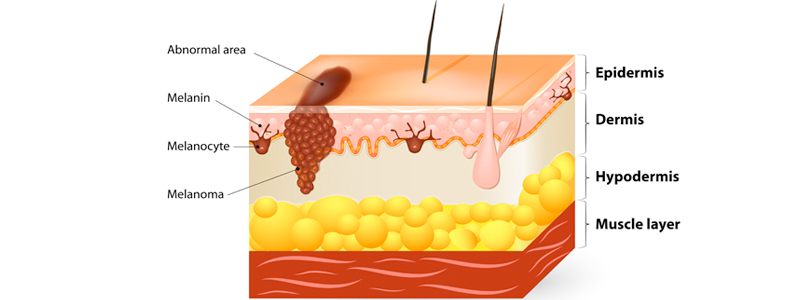Melanoma & Soft Tissue Sarcoma

Melanoma
Melanoma is a potentially life-threatening skin cancer of the melanocytes, the cells that make melanin (brown pigment). Melanoma's fatality rate is higher than that of basal cell and squamous cell cancers; it accounts for more than 80 percent of all skin-cancer deaths. Early detection and treatment greatly increase the likelihood of cure. Performing a self-examination in front of a mirror is the best way to detect melanoma in its early stages. If melanoma is suspected, a doctor should be contacted immediately.
Symptoms of Melanoma
Early signs of melanoma are related to changes in shape or color of existing moles, or the development of new ones. Early signs of melanoma are generally identified by the mnemonic ABCDE:
- Asymmetry
- Border irregularity
- Color variation
- Diameter greater than 6mm
- Evolution over time

Early signs of melanoma may develop from existing moles or may resemble moles. The majority of melanomas are black or brown, but can also be skin-colored, pink, red, purple, blue or white. During later stages, a melanoma may itch or bleed. If a melanoma is diagnosed and treated in its early stages, it is usually curable; however, during later stages, it can rapidly spread to other parts of the body, become hard to treat, and possibly be fatal.
Causes of Melanoma
What causes melanoma is not known, although there are many suspected risk factors, including:
- Familial tendency to develop freckles or prominent/atypical moles
- Presence of many freckles, moles, large moles or atypical moles
- Family history of melanoma
- Overexposure to ultraviolet radiation
- Overexposure to sunlight prior to age 18
- Caucasian ancestry, with fair skin
- Sun sensitivity or poor tanning ability
- Immune-system deficiency
- Previous melanoma
Although Caucasian ancestry is a suspected risk factor, all races and skin tones are susceptible to melanoma.
Treatment for Melanoma
Treatment for melanoma depends on its location, thickness and progression, as well as the patient’s age, health, medical history and preferences.
A biopsy is often performed to determine the extent of the cancer. Most often, the appropriate treatment is surgery, followed by adjuvant therapy, including interferon and vaccines, for patients at great risk for the cancer’s spreading throughout the body. Other common options are chemotherapy and radiation therapy, as well as biologic therapy, which includes interferon, cytokines, monoclonal antibodies and vaccines, to improve the body’s self-defense abilities.

Soft Tissue Sarcoma
Soft tissue tumors are those that develop in the connective tissue as opposed to bone. Skeletal muscle, fat, tendons, fibrous tissue, nerves and blood vessels are all considered soft tissue. Malignant, or cancerous, soft tissue tumors are referred to as sarcomas.
Soft tissue sarcomas may occur in any part of the body, but are most frequently found in the head, neck, abdomen, trunk, arms or legs. There are a number of different types of soft tissue sarcomas that vary depending on the tissue in which the malignancy initially occurred.
Risk Factors for Soft Tissue Sarcoma
Some people may face an increased risk of developing soft tissue sarcomas. Risk factors that may be associated with this condition may include:
- Certain inherited disorders
- Previous radiation therapy treatment
- Exposure to some types of chemicals
- Chronic lymphedema
Symptoms of Soft Tissue Sarcoma

The symptoms that may arise from a soft tissue sarcoma can vary depending on where the tumor has formed. Often, if it is on an arm or leg, the patient will notice a small, painless bulge beneath the skin. In cases where the sarcoma has formed within the abdomen, however, it may remain asymptomatic until it reaches a fairly large size. At that point, the sarcoma may begin to place pressure on nerves, muscles, blood vessels or organs in the area and cause pain or difficulty breathing.
Diagnosis of Soft Tissue Sarcoma
To diagnose a soft tissue sarcoma, a biopsy is performed. A portion of the tumor or the entire tumor will be removed to be analyzed in a laboratory. This provides the doctor with information about the cancer that helps determine the best course of treatment.
Treatment of Soft Tissue Sarcoma
Soft tissue sarcomas are typically treated with surgery. The tumor is removed along with a margin of surrounding tissue to maximize the chances of eradicating all cancerous cells and preventing recurrence. Some patients may require radiation therapy or chemotherapy in addition to surgery.
Our Surgeons Specializing in Melanoma & Soft Tissue Sarcoma

- Allen Agapay, MD
- General Surgeon
- Peoria
- Learn More

- Nathan Bodily, MD
- General Surgeon
- Gilbert & Mesa
- Learn More

- Ravia Bokhari, MD, FACS
- General Surgeon
- West Phoenix
- Learn More

- Charles Castillo, MD, FACS
- General Surgeon
- Central Phoenix
- Learn More

- Susan Cortesi, MD, FACS
- General Surgeon
- Mesa & Scottsdale
- Learn More

- Jordan Glenn, DO, FACS
- General Surgeon
- Peoria
- Learn More

- Rita Hadley, MD, FACS, PhD
- General & Bariatric Surgeon
- Mesa
- Learn More

- Richard Harding, MD, FACS
- General Surgeon
- Central Phoenix
- Learn More

- Jon King, MD, FACS
- General Surgeon
- West Phoenix
- Learn More

- Daveshni Kumar, MD, FACS
- General Surgeon
- Mesa & Scottsdale
- Learn More

- Patrick D. Lorimer, MD
- Surgical Oncology
- Chandler & Mesa
- Learn More

- Karthik Raghavan, MD, FACS
- General Surgeon
- Glendale
- Learn More

- Greg Rula, MD, FACS
- General Surgeon
- Mesa
- Learn More

- Mark Runfola, MD, FACS
- Surgical Oncology
- Mesa
- Learn More

- David Smith, MD, FACS
- General Surgeon
- West Phoenix
- Learn More

- Alvaro Testa Jr., MD, FACS
- Reconstructive & Plastic Surgeon
- Gilbert & Mesa
- Learn More

